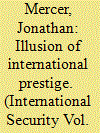|
|
|
Sort Order |
|
|
|
Items / Page
|
|
|
|
|
|
|
| Srl | Item |
| 1 |
ID:
147726


|
|
|
|
|
| Summary/Abstract |
Ideology is generally considered as one of the key reasons, if not the main one, for the collapse of the Soviet Union. Indeed, Italian political philosopher Norberto Bobbio asserts that "the catastrophe of historical communism" was not caused by a systemic crisis or a military defeat, but the fact that "in a seemingly irreversible way, the greatest political Utopia in history ... has been completely upturned into its exact opposite." "Sociologized" interpretations of the ideological crisis portray it as the de-legitimization of Soviet power through its own practices (inequality, corruption, nepotism, etc.), which turned the moral principles and goals the country had declared into their grotesque semblance. More "belletristic" interpretations blame it on "the troubadours of perestroika," who exposed the "lies" of communism and opened the eyes of millions of people deceived by the system (Leon Aron's book Roads to the Temple is a classic example). In any case, the crisis of ideology that undermined the Soviet regime was manifested in various ways: 1) as a process that disavowed "Marxism-Leninism" (as an ill-fated Utopian experiment and "the opium of the people"); 2) as a catharsis that leads from the "world of lies" to the "world of truth" (even though Bobbio describes the latter as just another kind of Utopia--that of a free market economy and democratic capitalism); 3) as a pivotal event that brought former communist countries onto the path of progressive and "civilized" development.
|
|
|
|
|
|
|
|
|
|
|
|
|
|
|
|
| 2 |
ID:
152918


|
|
|
|
|
| Summary/Abstract |
Policymakers and international relations scholars concur that prestige is critical to world politics because states having prestige enjoy greater authority. An examination of how policymakers assess their and other states' prestige, however, reveals that this traditional view of prestige is wrong, for two reasons. First, policymakers do not analyze their own states' prestige, because they feel they already know it. They use their feelings of pride and shame as evidence of their state's prestige. Second, political and psychological incentives encourage policymakers to explain another state's behavior in ways that make it unlikely that states gain prestige. Policymakers systematically discount the prestige of other states; a belief that their state has earned the respect and admiration of others is therefore illusory. Consequently, the justification for costly prestige policies collapses. In other words, states should not chase what they cannot catch. Evidence from the South African War supports this conclusion.
|
|
|
|
|
|
|
|
|
|
|
|
|
|
|
|
| 3 |
ID:
138851


|
|
|
|
|
| Summary/Abstract |
Richard Betts argued that strategy—the idea that a state’s political ends could be reliably linked to its coercive means—is a necessary illusion. Without strategy, war is mindless killing; but its rationales cannot guide state choices because there is a yawning gap between the macro level where strategy is articulated and the micro level of day-to-day choices. That gap is particularly insurmountable when beginning, as Betts does, from a rationalist model of action. I propose that grand strategy is best understood as a case of collective intentionality, a concept that amends the rationalist framework in a way that makes it possible to clarify an analytic pathway from grand strategy to state behavior. Crucial to this pathway are legitimation processes found in forums, and I argue that grand strategies can pull state behavior when they are tied to forums. Focusing on the interstate case, I develop a causal mechanism from the forum, to ways of talking, to commitment-consistent behavior. I illustrate the argument with an example from the Concert of Europe. Stacie E. Goddard and Ronald R. Krebs propose that legitimation processes might be particularly successful where institutions are weak. My framework helps flesh out that proposition: even in anarchy, action commitments can affect states’ behavior through the mechanisms of the forum.
|
|
|
|
|
|
|
|
|
|
|
|
|
|
|
|
| 4 |
ID:
092222


|
|
|
|
|
| Publication |
2009.
|
| Summary/Abstract |
Matsuura Hisaki's novel Hant?[Peninsula] contains a highly saturated critical and poetic space, allowing us to probe the boundaries of Japan's periphery and the limits of the experience of interiority. An analysis of the structure and the narrative devices of the novel leads to the creation of a spatial model conceptualizing the idea of 'peninsula' as an existential and literary trope. The 'peninsula' is also a reversible notion combining the narrative of a private experience of seclusion with critical commitment for reconsidering modern Japan's cartography.
* 1Earlier versions of this essay were presented at the graduate seminar of Prof. Kawamura Minato (H?sei University, 12 June 2008) and the Cultural Typhoon (Sendai, 28 June 2008). I am grateful to Prof. Kawamura for his valuable suggestions, to Prof. Matsuura Hisaki for an interesting discussion (June 2008) and to the anonymous readers of Japanese Studies for constructive feedback.
|
|
|
|
|
|
|
|
|
|
|
|
|
|
|
|
|
|
|
|
|